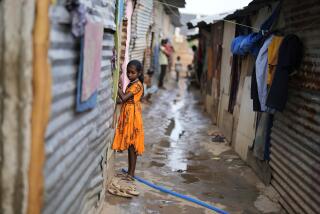Delhi street children count on themselves
- Share via
NEW DELHI — The bank manager’s tone was crisp and efficient.
“Name?” he asked.
“Amit,” came the reply from beneath a grimy white baseball cap.
“Father’s name?” asked the manager, 14 years old and all business.
“Sanjay,” said the customer, 13.
With his identity thus established, Amit Kumar Tripathi withdrew 330 rupees, or about $8.25, from his savings account, which Ajay Singh Choudhury, the skinny manager, fished out of a drawer, handed over in a wad of rumpled notes and dutifully recorded in a ledger almost as big as his torso.
Then it was on to the next boy in line at one of the more unusual financial institutions in India’s capital.
Run almost entirely by and for street children, the bare-bones bank sponsored by a local charity offers the youths a safe place to stash the bits of money they earn picking through trash for recyclables, hawking magazines and fruit at intersections or busing tables at wedding banquets.
India is home to the world’s largest population of street children, conservatively estimated at 10 million.
Their lives are far removed from the country’s growing image as an economic juggernaut powered by software engineers and ornamented with Bollywood babes. Theirs is a parallel world of struggling to survive, a world where adolescent angst is about whether another meal comes your way, or whether you can sleep through the night, unmolested, on a hard patch of pavement.
In Delhi alone, more than 100,000 youngsters are believed to live on the streets. Many remain with their poverty-stricken families, but thousands do not. A large number cluster around the city’s main railway stations -- heavily trafficked areas where they can sell their wares and where passengers leave behind detritus they can pick through.
Boys scooting between train tracks, darting in and out of newly empty railway carriages, are a common sight. Many are harassed or beaten by police officers, or sexually abused by predatory adults. A fair number resort to sniffing glue. Some beg, others steal.
Many of these “railway children” are runaways who have come to the Delhi metropolis to escape abusive households or the monotony and poverty of life in the countryside.
Rohit Kumar Prasad, a sweet-faced 13-year-old who wears a silver talisman of the monkey god Hanuman around his neck, said he fled nearly two years ago from his home in the impoverished state of Bihar, in eastern India, because his father beat him.
He spends three to four hours a day hawking slices of fresh coconut at the Delhi Main Railway Station, in the crowded precincts of the Old City. He can make about 100 rupees, or $2.50, a day, part of which he sometimes spends on a plate of his favorite food, chicken and rice, as an occasional treat.
Slender and small for his age, Rohit harbors aspirations of becoming a doctor. “I want to look after poor people and their children,” he said.
He sleeps in a shelter for boys run by a local charity called Butterflies. To help the youths plan for a less bleak future, the charity set up its Children’s Development Bank in 2001, a way for street children to learn lessons about money and saving that, for most, their parents aren’t around to teach.
“We see this as a life skill,” said Sebastian Mathew, director of the project. “How much they save is not important. It’s the habit of saving and not spending their money on sniffing glue, smoking, watching the same movie again and again.”
About 2,000 children have accounts at 12 “branches” around Delhi, located in shelters or at sites where the charity runs classes and other activities for homeless youths. Adult staff members are always present to ensure the safety of the children and to collect the takings at the end of each day, depositing the cash at regular intervals in a dedicated account in a private bank.
But in most respects, it’s the children who run the show and set the rules. At each branch, the account holders, who range in age from 9 to 18, elect two volunteer managers from the group every six months. The youngsters decided that the bank should do its best not to allow deposits of money made from stealing or selling drugs and pornography.
The branch inside the shelter near the train station sits in the corner, looking more like a lemonade stand than a house of finance. But the long box full of passbooks, and the earnest expressions of the young managers who staff the branch for an hour each evening, speak to a serious purpose.
“The children are able to deposit and save money. If they keep the money on them, it’ll get stolen, or they’ll blow it or get addicted to drugs,” said Ajay, the manager, who shares the post with Rohit.
Tired of school, Ajay ran away from the mountainous state of Uttaranchal and washed up in Delhi a year and a half ago.
He likes the status and responsibility that come with being manager, although it cost him once, when he paid out 20 rupees, about 50 cents, too much to a boy making a withdrawal on a hectic day and had to make up the shortfall with money out of his own pocket.
Sanjay Kumar, a serious 13-year-old with his hair carefully combed and his shirt tucked into pants that looked a size too big, joined the queue of jostling and roughhousing bank customers one recent evening. He handed over all of the 150 rupees, about $3.75, he had earned that day from serving drinks and washing glasses at a party, carefully checking his passbook to make sure the deposit had been credited.
He opened his account 2 1/2 years ago. It now bulges with 3,600 rupees, about $90, and has earned interest of about 90 rupees, or $2.25 -- an enviable sum by the standards of children living rough, and an incentive to continue saving.
“I want to do something when I’m older,” Sanjay said. “I want to open up a tea shop.”
Once he turns 15, he can apply for a loan. The bank lets older youths borrow money to start businesses or continue their schooling.
Amit, the boy in the baseball cap, needed to tap into his savings for a train ticket to his village in Uttar Pradesh state because his father was laid up with a broken leg. But at the same time that he withdrew 330 rupees from his savings, the scrappy youth thoughtfully deposited 20 rupees into his separate current account.
“What little I have I put here,” Amit said. “I’m saving up because I want to get educated. This money will go to good use.”
--
More to Read
Sign up for Essential California
The most important California stories and recommendations in your inbox every morning.
You may occasionally receive promotional content from the Los Angeles Times.














